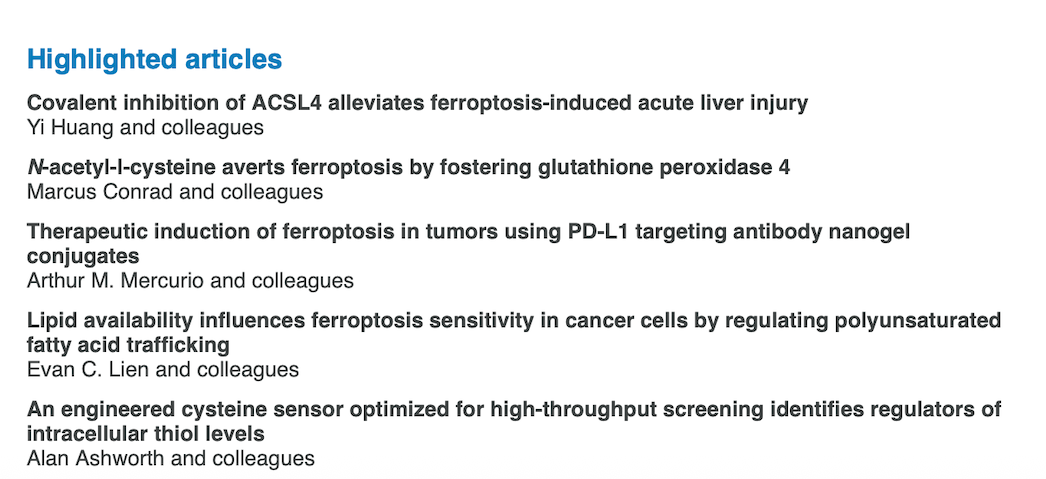Boris's Paper on Ferroptosis Impeding Metastasis is Published in Cell Reports!
Abstract
We investigated a potential function of transient receptor potential cation channel 6 (TRPC6) in enabling breast cancer cells to resist stimuli that induce ferroptosis. A minority population of quiescent cells was isolated from triple-negative breast cancer (TNBC) cell lines that exhibit increased TRPC6 expression and resistance to ferroptosis compared to proliferating cells. These quiescent cells are also more metastatic than the proliferating cells, supporting the hypothesis that metastasis requires the ability of cells to evade ferroptosis. In pursuit of the mechanism, we discovered that the ability of TRPC6 to repress c-Myc is essential because its repression sustains levels of glutathione that are sufficient to impede ferroptosis. Importantly, treatment of TNBC cells with a TRPC6 inhibitor reduces metastasis significantly, an effect that is mitigated by a ferroptosis inhibitor. These results indicate that a sub-population of TNBC cells characterized by TRPC6 expression has the potential to form metastases by evading ferroptosis.
Dimitrov BS, Mukhopadhyay D, Goel HL, Karner ER, Silva CA, Kumar A, Peterson C, Wang M, Mercurio AM. Inducing ferroptosis to impede metastasis by inhibiting the calcium channel TRPC6. Cell Rep. 2025 Nov 25.
Ayush's Paper on Radiation Resistance Enhancing Metastasis is Published in Science Advances!
ABSTRACT
The cellular programs that mediate therapy resistance are often important drivers of metastasis, a phenomenon that needs to be understood better to improve screening and treatment options for patients with cancer. Although this issue has been studied extensively for chemotherapy, less is known about a causal link between resistance to radiation therapy and metastasis. We investigated this problem in triple-negative breast cancer and established that radiation-resistant tumor cells have enhanced metastatic capacity. Resistance to radiation increases the expression of integrin β3 (ITGB3), which promotes enhanced migration and invasion. Bioinformatic analysis and subsequent experimentation revealed an enrichment of RNA metabolism pathways that stabilize ITGB3 transcripts. Specifically, the RNA binding protein heterogeneous nuclear ribonucleoprotein L (HNRNPL), whose expression is regulated by Nrf2, mediates the formation of circular RNAs that sponge the family of let-7 microRNAs that target ITGB3. Collectively, our findings identify a mechanism of radiation-induced metastasis that is driven by alterations in RNA metabolism.
Kumar A, Kishimoto K, Goel H.L, Silva CA, Li R, Pacheco B, Zhu LJ, Flavahan WA, Mercurio AM. Resistance to radiation enhances metastasis by altering RNA metabolism. Sci Adv. 2025 Oct 17.
Boris Presents his Poster at the Cancer Biology Program Research Retreat!
Last week, Boris Dimitrov shared his current work on “Inducing Ferroptosis to Impede Metastasis by Inhibiting the Calcium Channel TRPC6” at this year’s annual Cancer Biology Program Research Retreat.
Emmet's Paper on GATA3 Promoting Ferroptosis Resistance is Published in PNAS!
ABSTRACT
Understanding mechanisms that determine the response of cells to ferroptotic stress isa timely issue that has significant ramifications for biology and pathology. We inves-tigated these mechanisms in the context of breast cancer where tumors are composedof diverse populations of cancer cells that differ in their ferroptosis sensitivity. Usingsingle- cell RNA-sequencing, we determined that cancer cell populations with luminaldifferentiation are more resistant to ferroptosis than other cells within a heterogeneoustumor. Subsequent bioinformatic analysis and experimentation revealed that GATA3,a transcription factor that promotes luminal differentiation, has a causal role in ferrop-tosis resistance in luminal breast cancer cells. In pursuit of the mechanism involved, wefound that GATA3 represses the expression of integrin β1 and its downstream signalingcascade. This observation led us to demonstrate that integrin β1 signaling is necessaryfor sensitivity to ferroptosis in basal breast cancer cells because it regulates a FAK/ROCK pathway that sustains the expression of ACSL4, a lipid-modifying enzyme that isessential for ferroptosis. The repression of integrin β1 by GATA3 inhibits this signalingpathway, rendering cells ferroptosis resistant. Together, these data provide insight intomechanisms of ferroptosis sensitivity and resistance that are linked to the cell biologyand signaling pathways of the diverse types of cells present in breast tumors.
E.R. Karner, M. Wang, H.L. Goel, A.M. Mercurio. GATA3 promotes ferroptosis resistance by repressing integrin β1 signaling, Proc Natl Acad Sci U S A. 2025 Aug 19.






